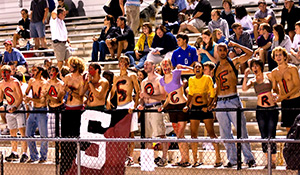
Magill's 100 Rules
In 1883, the College's second president Edward Magill issued a strict code of conduct to govern students, known as the "100 rules." They stand in stark contrast to the Swarthmore Bucket List of 150 things that resonate with current and past students to do before graduation. The Rules reflect the founders' interest in providing discipline and a guarded education to Swarthmore students, although they were liberalized to attract more students near the end of Magill's tenure as president in 1889.General Laws
All passing of letters or notes in class, lectures, collections, or elsewhere is forbidden.
During the change of classes there must be no loud talking or disorder on the halls or stairways, or in the classrooms or study rooms.
Students and others residing in the College, having friends visiting them, are required to obtain tickets for meals in advance. The proceeds of the sale of these tickets go the library.
Students are not to take dishes or other articles from the dining room to their own rooms.
Students on leaving their chambers during the evening must turn down or extinguish their lights.
All students of the Preparatory School, except Class C, are required to attend two collections at the close of the morning and afternoon sessions, and such others as may be established by the Faculty.
All students are required to attend the religious meetings on the First day of the week, and also those held at the opening of the exercises on other days.
Boating, swimming, skating, ball playing, and other sports are forbidden on the First day of the week. Boating, swimming, and skating are allowed only under such regulations as are established by the Faculty, and duly announced.
When any conduct tending to general disorder occurs in a class or general collection, the instructor in charge, not detecting the offenders, may select students from those sitting in the part of the room where it is observed and detain them on holidays or during delinquent sessions, unless the offenders acknowledge their guilt; or they may inflict such other penalty as may be necessary to prevent disorder.

